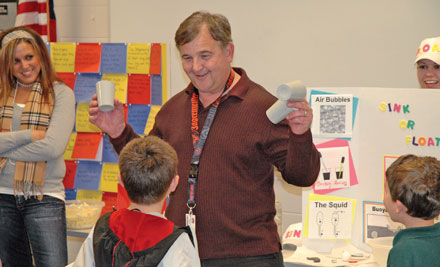University Communications and Marketing
Inquiring Minds Want to Know
August 8, 2008
Contacts:
Dr. Ken Miller, Professor, College of Education, 657-2034
Dan Carter, University Relations, 657-2269
MSU Billings professor takes the lead in reforming how science is taught in Montana schools
By Dan Carter
MSU Billings News Service
“I wonder…”
That simple inquiry, a pondering about how the world connects on its most basic levels, is what’s at work when a child sifts through dirt to find worms or watches the clouds float across the sky. With the help of a three-year grant of more than a half-million dollars, a Montana State University Billings professor will help elementary educators from across the state implement that theory of inquiry in science teaching.
Dr. Ken Miller, a professor in the department of education theory and practice at the MSU Billings College of Education, was recently awarded a $675,000 Partnership to Reform Inquiry Science in Montana (PRISM) grant to strengthen that effort. Over the next three years, he will work with more than 30 educators in 15 school districts across central and southern Montana to develop and strengthen both the pedagogical and content understanding of inquiry-based science teaching.
The idea, Miller said, is to promote and encourage teaching methods that allow students to find out for themselves just how cool science really is.
“The idea is to help the child discover things on their own instead of the teachers giving them the lessons and the answers,” said Miller, who spent 15 of his 30 years of experience teaching in the science classroom.
It’s all about sparking that inquiry.
As an example, Miller folded a plain piece of paper and placed it like a mini pup tent on desk. What would happen, he asked a visitor, if he blew a stream of air through the inside of that folded paper, like wind through tent?
Will it fly? Will it collapse?
After a puzzled look from his guest, Miller sends a puff of air through the tent and the sides cave in.
The reason is found in Bernoulli’s Principle, which is often found elementary science textbooks as an introduction to how airplanes fly. That principle says that as the speed of a moving fluid increases (in this case, the air) the air pressure of that fluid decreases. And with increased air pressure on the outside of the paper walls of Miller’s quickly made tent, it collapsed.
The methods many teachers use these days would rely on reading the definition of Bernoulli’s Principle in a textbook, having students memorize it, and then look at an illustration in the textbook. Come test time, the students could probably regurgitate the accumulation of facts, but it is not science, Miller said. By reversing the process to allow for experimentation and inquiry, they can relate what they experience to content and principles.
“It’s more of a mindset,” Miller said. “They can ask ‘how can I do this in more of an inquiry-based way?’ ”
The concept of inquiry-based teaching has been around for decades, Miller said, and the National Science Education Standards have called for inquiry as the predominant mode of delivery of science concepts in classrooms for kindergarten to college.
“However, it remains painfully clear, when observing science teaching in our schools,” Miller wrote in his grant, “that little of these published efforts have resulted in significant change in classroom delivery.”
Schools and educators partnering in the grant will come from the Region III Southern Montana Alliance for Resources and Training. The region includes schools from communities large and small, from Lewistown to Billings to Red Lodge. The grant will target classroom educators in grades 3-6.
Miller said the timing of the grant is good because smaller school districts are restructuring and all school districts continue to work on meeting national education standards. Success in any of those endeavors, he said, relies on the development of highly skilled, effective teachers. And in order to be effective, those teachers should be encouraged to remain knowledgeable in the latest pedagogical research and innovative teaching strategies, such as inquiry.
The PRISM grant will do just that, Miller said, but bringing together a cohort of educators to learn about the best ways to promote creative and analytical thinking in the classroom and then encourage their peers do the same.
The first cohort of 30 teachers begins work at MSU Billings on Aug. 12 with some introductions and initial training. Other training will take online and at individual schools.
Miller also said the grant demonstrates the kind of collaboration that exemplifies quality education at MSU Billings. Staff at the Montana Center on Disabilities helped write the grant and university science faculty will help classroom teachers apply inquiry methods as they work to understand Montana content standards.
Ultimately, Miller said, those classroom teachers will dislodge old methods and become inquiry leaders in their school districts and the state.
For more information on the PRISM grant, contact Miller at 657-2034 or via e-mail at kmiller@msubillngs.edu.

Dr. Ken Miller, MSU Billings professor of education, posing a science question to a youngster at a science family fun night event.
